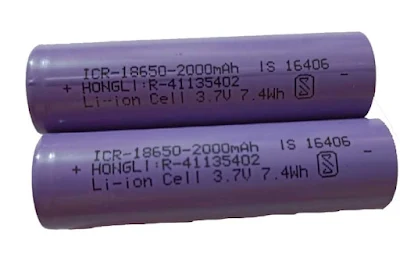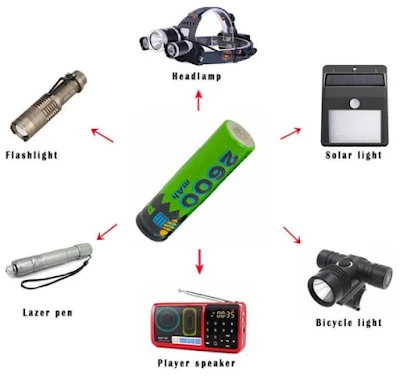What is a Lithium Battery and Its Uses
**"Lithium Battery: A Marvel of Evolving Technology"**
The lithium battery has become a crucial technological tool in today's digital world. These batteries have simplified our lives, especially when it comes to the use of electronic devices, electric vehicles, and renewable energy sources. In this blog post, we will explore what lithium batteries are, how they work, and the various areas where they find applications.
**Introduction to Lithium Battery**
A lithium battery is a type of rechargeable battery that stores energy using either lithium metal or lithium ions. The primary reason for its popularity is the lightweight nature of lithium and its ability to provide high energy density. High energy density means that it can store more energy per unit weight, which is crucial for electronic devices.
**How Does It Work?**
Understanding how lithium batteries work is essential for us. These batteries consist of an anode (positive terminal), cathode (negative terminal), electrolyte, and separator. When the battery is charged, lithium ions move from the cathode to the anode, where they store energy. When the battery is discharged (i.e., when energy is used), lithium ions move from the anode to the cathode, generating electricity in the process.
**Applications**
Lithium batteries have various commercial and industrial applications. Here is a discussion of some primary uses:
1. **Mobile Phones**: Modern smartphones use lithium-ion batteries, making them lightweight and high-performing.
2. **Laptops**: Laptop computers also utilize lithium batteries, providing portability and extended battery life.
3. **Electric Vehicles (EVs)**: Electric cars and bikes use lithium-ion batteries, offering long-range capabilities and fast charging.
4. **Renewable Energy Storage**: Lithium batteries are used to store solar and wind energy, making it easier to harness renewable energy sources.
**Conclusion**
Lithium batteries hold a significant place in today's technological world. Their use makes our daily lives more convenient and environmentally friendly, especially when coupled with renewable energy sources. In the future, we can expect further advancements and improvements in these batteries, enhancing their utility in our lives.
In what tasks is the 3V lithium battery used?
The use of 3V lithium batteries is common in various small electronic devices. Here are some devices where 3V lithium batteries are used:
1. **Watches**: These batteries are often used in watches. Due to their long shelf life and steady voltage output, they are useful for keeping watches running accurately.
3. **Remote Controls**: They are used in remote controls for devices like televisions, DVD players, and set-top boxes.
4. **Pedometers**: Pedometers and fitness trackers can also use 3V lithium batteries.
5. **Small Medical Devices**: Some small medical devices like glucometers and thermometers may use these batteries.
6. **Electronic Toys**: They are used in electronic toys for young children, such as musical toys.
7. **Key Fobs**: Car key fobs and access control systems often use 3V lithium batteries.
These batteries are useful for providing power to small electronic devices, and their steady voltage is crucial for the proper functioning of these devices.
What are the Voltage Rating of Lithium Batteries and Their Uses
Lithium batteries various voltage ratings depending on their specific configuration and purpose. Common lithium-ion battery voltages include:
1. **3.6 Volts (3.7 Volts nominal)**: This is a common voltage for single-cell lithium-ion batteries used in many consumer electronics like smartphones, tablets, and cameras.
2. **7.2 Volts (7.4 Volts nominal)**: Often used in two-cell lithium-ion battery packs for larger consumer devices and some power tools.
3. **11.1 Volts (11.4 Volts nominal)**: Common in three-cell lithium-ion battery packs, often used in drones and radio-controlled devices.
4. **14.4 Volts (14.8 Volts nominal)**: Found in four-cell lithium-ion battery packs used in laptops and cordless power tools.
5. **22.2 Volts (22.8 Volts nominal)**: Used in six-cell lithium-ion battery packs, often found in high-power applications like electric scooters.
These voltage values are nominal, and the actual voltage can vary depending on the charge level of the battery. It's essential to use the appropriate voltage and type of lithium battery for your specific device to ensure safe and efficient operation.
Disclaimer about lithium batteries
**Disclaimer: Use and Handling of Lithium Batteries**
1. **Safety Precautions**:
- Lithium batteries are sensitive to physical damage, extreme temperatures, and improper handling. Exercise caution when using, storing, or disposing of lithium batteries.
- Do not puncture, crush, or expose lithium batteries to high temperatures, fire, or direct sunlight.
2. **Proper Usage**:
- Use lithium batteries only with devices specified by the manufacturer. Ensure the battery is compatible with your device.
- Follow the manufacturer's instructions regarding charging and discharging cycles.
3. **Charging**:
- Use only chargers designed for lithium batteries. Overcharging or using incompatible chargers can lead to battery damage or failure.
- Do not leave batteries unattended while charging. Remove them from the charger once fully charged.
4. **Storage**:
- Store lithium batteries in a cool, dry place away from direct sunlight and extreme temperatures.
- Keep batteries out of the reach of children and pets.
5. **Disposal**:
- Do not dispose of lithium batteries in regular household waste. Follow local regulations for proper disposal or recycling.
- Consider recycling options provided by battery manufacturers or recycling centers.
6. **Warnings**:
- In case of battery leakage, skin irritation, or other adverse reactions, seek medical attention immediately.
- Discontinue use of a lithium battery if it exhibits signs of damage, such as swelling, overheating, or unusual odor.
7. **Liability**:
- The user assumes all responsibility for the safe and proper use of lithium batteries. The manufacturer and seller shall not be liable for any damage or injury resulting from misuse or mishandling of lithium batteries.
Please note that this is a general disclaimer. If you intend to use it for a specific product or application, it's advisable to consult with legal professionals or ex
perts who can tailor the disclaimer to your particular needs and comply with relevant laws and regulations.



